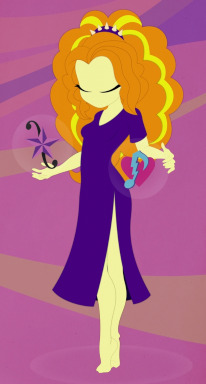
Enter This Chapter, Infinitely
The bedroom was empty, silent but for the memory of fading motes of perfect symphonies, haunted by raptures of sound never to be heard again. Inside her head, Adagio could almost tune out the brash punk music shaking the wall to the next bedroom, and ignore the wretched sobs coming from the opposite side.
Once, she had breathed life into these four walls, privileged them with being the sole, wordless audience for her spontaneous symphonies, listened to the echoes they reflected and adjusted her performance from their trusted feedback. Every portrait she had painted with melodies, every abstract vision given form and substance: they had permeated the room and made it a temple to something higher. Here she had sought to express something infinitely more vast; a tapestry of the universe woven from song. An answer to it. And she had not been without some success.
Now, even the echoes were long gone, her own memories the only evidence they’d ever been.
And all those notes were stuck inside her head.
Like some shy, lovesick fool in one of those plays Sonata enjoyed, she longed to—had to—express her passion to the world, yet her mind couldn’t command her mouth to let it out as she intended.
She could write it down as poetry, perhaps, channeling her ideas into verse that another might read or speak aloud. But words were merely a bridge. They joined the abstract of music to the concrete of reality. If words alone could speak the truth she dreamed, what use would she have ever had for music?
Or she could use an instrument, realising her harmonies through her fingers, in her voice’s absence. If she had learned that skill a long time ago, she’d have an outlet now. But the few times she’d tried over the centuries, having to translate her thoughts through a foreign body had proven stifling. How could operating through such an interface match the seamless connection to her voice, and the unparallelled emotion it could express as soon as she felt it?
But now, even as a substitute possibility, there was no time to learn. Her creations would never leave her head.
The end would be here soon; that much she knew. A siren couldn’t survive without sustenance, and if she couldn’t process negativity through her gem, she’d starve. But what she would give to go out with her voice intact. To funnel every iota of herself into her swan song, burning up in a pillar of sound, as volumes said sirens had in days of old. To leave a scar behind her, a mountain to mark her passage from a world that had wronged her.
To become music, and live forever in that most perfect of forms.
Because nothing stuck in your head like a melody. Her lover—the greatest human to have ever graced their miserable planet—was revered by millions each day, despite being dead for two centuries, and would continue to be so adored for as long as the memory of a mere four notes remained. And the song she would have left behind…
Well, words couldn’t describe it. That was entirely the point, and the problem.
And the bitterest of ironies was that the only head her melodies would be stuck in was her own, tormenting her as she expired, mocking her with all that could have been. And all that could still be, if she only had a way to free them from the confines of her mind.
Maybe Aria felt the same way. She was a harmonist, an arranger, but she likely dabbled in composition now and then. And for the four days since the battle, and the sundering of their voices—the arts crime of the millennium—Aria had been barricaded in her room, with the loudest highlights of her music collection turned up to full on her speakers. Maybe she was just trying to drown out her own song, in her own head, knowing it could never be breathed into existence?
...Was it working?
Far too late to do any lasting good, perhaps it was time Adagio tried following Aria’s lead.
Dragging herself from the bed where she’d lain for too long, she shuffled over to her record collection, running her fingers over the edges of the sleeves on the shelves and trying to decide what she could stomach. The classics were all too twee for her mood, save for the few instead too morbid. She might be dying, but she wouldn’t cry about it. She wasn’t Sonata.
None of the records stood out to her as anything she wanted to listen to at that moment, and she was about to throw her hands up and try something different when she listened to an impulsive streak of stubbornness and grabbed one almost at random, her hand guiding itself to one in particular.
Pulling it from the shelf and out of its sleeve, she supposed it would do for now. It did fit the mood, at least. She slipped the vinyl disc onto the player, started it up and set the needle in place. Yes, a record player was old-fashioned, but there was a romanticism to it she couldn’t deny, one she just hadn’t felt with any of the recording mediums since. Aria could keep her tapes, CDs and downloads; Adagio was happy with her records.
And her speakers were cutting edge, so the demand to ‘join the 21st century’ had been unwarranted, with them sounding so convincing as the low strings opening the piece swelled into being that an ear with fewer centuries of training might have thought they were on the very scoring stage with the orchestra. With that, she reached for the knob and turned up the volume.
Since the aim was literally ‘too loud to hear herself think,’ she pushed it high enough to shake the floor, probably to leave her ears ringing afterwards—something she’d been so careful about in the past, but clearly didn’t matter now—but not so loud as to be uncomfortable. So far it hadn’t had the desired effect, but maybe it would once the tune kicked in and she was able to lose herself in it more?
The parallel modulation, undulating between major and minor each bar, lent a dark, unstable air to the piece, and she relaxed into how it lined up with her feelings. The placeholder motif having set the scene, the violins launched into the main melody over the top, and by the repeat she noticed that, down by her waist, the tips of her hair were swaying, magnifying the tiny movements she hadn’t realised she’d been making of her head.
At that moment the violins swelled, lingering on a note in the melody as the harmony beneath modulated. The new key of the minor subdominant then twisted the melody note into a different perspective, and she allowed her body to indulge in the bigger movements it wanted to of her neck rolling gently side to side on her shoulders. That key change always got her, she had to admit.
She closed her eyes, trying to block out everything in the world that wasn’t the music, and soon found her hips rocking too.
The melody which followed flowed like a waterfall, lingering around two adjacent notes before the plunge pool filled, carrying the tune off to the next set down and repeating the pattern. The alternating major and minor underpinning was back, too, and the unexpected notes blended together to give a faintly Arabian feel.
All of which put her in mind of a snake being charmed, swaying back and forth on the spot, just as she was. That led to her shifting her weight from one leg to the other with each way she leaned, and then in turn to lifting the opposite foot from the ground. With her eyes still closed, she barely noticed that she was soon slowly turning on the spot, each foot coming down further round in a circle than it left off.
She was dancing.
And why not? She’d always enjoyed it, whether it was a stage routine to complement the music or a social courtship ritual among societies too repressed to be open about their sexual desires. So, historically, all of them.
So she danced, bringing her arms into it, venturing out beyond slow rotation with her steps, doing whatever felt natural at the time. The delicate violin figure when the melody moved to the violas inspired her to stretch her arms above her head, clasping her fingertips as she slowly spun, and when the key change from before repeated and the violins soared higher, she raised herself onto the tips of her feet, a ballerina pose she hadn’t tried in a hundred years. She didn’t have the shoes for it of course, so hardly managed to get truly en pointe, but the long-haired carpet on the floor wasn’t right for that anyway.
The crescendo simmered back down, the melody subsiding into snippets of the same Arabian scale, which she mirrored with a sinuous circling of her hands above her head with the insides of her wrists pressed together, only realising moments afterwards that the movement came from the belly dances the three of them had performed during their time in Arabia in the 11th century.
And yet it felt a fluid development, a twist on the ballet steps bearing her name. She’d taken two styles half a world and eight centuries apart, and forged them into one smooth outpouring of feeling. And without meaning to do so. Naturally linked with only herself as the common thread.
Was that the answer? The main theme started up again. She moved without thinking, unaware of where her movements came from historically. Like music, dancing was an abstract, and became all the more so when the schools of thought behind the forms were forgotten, and only the moves themselves remained. It wasn’t the same to her in expressive terms as her voice, but perhaps it was the best she would get under the circumstances?
Could her dance be the medium for her final song? Would it be enough to launch it from her head out into the world?
She certainly had nothing left to lose in trying.
And so, as the main theme broke off to instead dwell on a sad, soft refrain, layered with a minimal melody, she allowed her thoughts to return to the music inside her so desperate to emerge.
But there was no dance move equivalent to the opening chord she had in mind, no way to choreograph the harmonic progression. It wouldn’t come out that way, and her movements were only kept from faltering as she tried by a siren’s grace further honed by hundreds of years of practice.
If trying to channel the music only led to the blockage of her absent voice, she needed to seek the deeper meaning beneath the notes. A song was a story, when you got right down to it. Fuelled by feelings, shaped by experiences, inspired by meanderings of conscious thought. Hers was an endeavour to encompass the whole universe, yes. But her composition was the lens through which it was to be viewed.
So really, it was her story.
And who was she, as its lead character? What constants were there in her long life, now she was able to view it in its entirety, knowing its fixed end point soon to come? Two faces appeared in her mind’s eye, but no places. Splendour and indulgence were common settings, but the actual locations changed, never repeating.
She’d never thought of herself as a wanderer, but the evidence was hard to argue with. Wander—that was what she did. Drift into a place promised of in whispers; observe, integrate, enjoy, and, if so inclined, dominate.
And then leave, when you grew bored with them, or they revolutionary with you. There was never any question of a return. Even if there weren’t archaic laws banning three women with beautiful voices from the province, there was the question of why they would ever seek to go back, rather than going onto something new, striving to find somewhere better.
That was her story; her song. Her body echoed the sentiments, flashing through moves learned from cultural traditions long abandoned, the last legacy of civilisations now little more than dust. She was a remembering machine. A witness to—and frequent instigator of—the best and worst a society could offer, preserving it in the record of her memory.
But she was also an agent of destruction, and with her death, she would extinguish the living testament of those societies from existence forever.
A lifetime of moving on, not looking back as the paradise they had known, and in some cases created, burned behind them. Why should she have expected it to be any different with life itself? She had indulged as hedonistically as she knew how, drunk every opulence from it that she could, and, now that the well had run dry, it was time for her to move on. There was no full circle for her, no homecoming, no retirement; just an end to the places left to go next.
And, for all her lamenting the lack of a scar to leave behind, perhaps time would reveal and publicise her history of influence across the face of the planet. Empires she had built, and others she had toppled. The desert dunes would swallow any civilisation, sooner or later, once enough had passed through the neck of the hourglass. And, if the image of a face imprinted into those granules was the most permanence anyone could hope for, then she had left her trace—often in the form of that sand being mixed with blood, and bloody ashes.
How did the harbinger of death face her own end?
With dignity. She would show them how it was done.
Aria had always been the one to delight in the downfalls of their societies, itching to tear them down during the towering years even while enjoying her fair share of the decadence, and basking in the flames when they were consumed. Shiva, men had once called her, in one corner of the world. And Adagio could appreciate being the whirlwind from time to time, leaving nothing in her wake, but she rarely lusted for it in the way Aria did—much the same as how she’d never had the same attachment to the things they built as Sonata did. For her, the decline phase of their stay in each place was certainly a downturn in the ebbs and troughs of her life, but an inevitable one.
So when it came to what for her would be the final descent, she wasn’t ready. Not by millennia. But she also knew that no one ever was.
The music chose that moment to thin out to a single, high note, devoid of backing, diminishing into nothingness. She held her pose as it died away, arms outstretched. The result was much closer to silence than she expected, as she noticed that Aria’s music from the next room had stopped sometime during the piece.
Opening her eyes, she turned towards her doorway, knowing what she’d see there. Sure enough, two faces watched her from beside the ajar door, one with magenta eyes turned puffy and bloodshot, the other with purple, and an unreadable expression. How bizarre she must have looked, dancing in a corner of the floor all by herself, and in broad daylight.
But that was ok. She felt no embarrassment in front of them.
After a brief pause, the violins began anew, even higher than before, with a delicate, whisper-quiet held note, naked in all its vulnerability, but all the more pure for it, and beautiful. It hung in the air, feeling to her like something alive, seeming to broadcast its existence to the world.
The minimal backing of lower strings faded in and out, as if the long note were breathing, unconcerned with how fragile it was in its exposure, instead finding freedom in the surrounding silence between the swells. That pulsing returned some rhythm to the piece, and, hardly noticing it, Adagio felt herself swaying again.
Perhaps the three of them, too, had some freedom in their silence. For the first time in recent memory, Aria and Sonata were standing next to each other and not bickering. How could they tarnish their every interaction with hateful words, when none of them could speak any words at all?
Such long lives they had led, surrounded by such riches, and blessed with such gifts that they were the envy of all those they ever came across. And yet, her last days would be defined by being willing to happily give up so much of that, just to get back something that most people took for granted.
No more talking. No more singing. Those lives were over; lived out and now done. But lived out together. And, with all that time spent together, surely they could still understand each other, even without words? Could Adagio not predict what each would say, if they were able?
Looking into Aria’s eyes, the message was as clear as a cloudless Alpine sky. And heartbreaking to witness. Not a glimmer of hope was to be found there. Sonata’s didn’t have that same certainty, but she looked lost; permanently adrift in an unending wilderness. As if in answer to this, the melody on the violins slunk down and away.
But then it returned to the main theme, regaining its confident footing as it crescendoed towards the familiar key change, and Adagio knew what to do. Keeping her eyes on Aria and Sonata, she extended her left leg behind her, lifting it into an arabesque penché, arms high and low in front of her for balance. From there she swung it smoothly into a series of sweeping golden lotus toe swirls from 10th century China, as if stirring the edge of a tranquil lake, and then onto a move she knew they’d recognise from when they’d danced the sa’sara.
Through each move, she reached out one hand toward Aria and Sonata, where they stood in the doorway, imploring them to join her. She drew it back in when the wonderful modulation struck so that she could launch into a series of six fast pirouettes to match the viola countermelody, dipping her heel back to the floor between each one to keep the spinning momentum. Each time her head snapped around, her eyes found theirs again immediately, locked onto them as she completed each rotation.
She danced in her melancholia, celebrating it as the last thing she might ever feel, and she invited them to join in; to be with her to enter the infinite final chapter of their time together.
Sonata moved first.
Walking half-dazed, she wandered over to her usual position on Adagio’s left, alternating between meeting her eyes and looking away. On her arrival, Sonata relaxed into a demure pose, standing with her weight on one leg, the other bent with toes to the floor, and her head bowed, with her hands clasped behind her back. She glanced up to Adagio, then to Aria, and then back down.
Adagio turned her own attention to Aria, who was giving her a weighing look, pain and loss still undisguised in her eyes. And then, as the music hushed again, slowing and spiralling down to the short coda of the first movement, she evidently made her decision, and strode into the room with far more purpose than Sonata had.
Then it was Adagio’s turn to be surprised, as, rather than moving to the spot on Adagio’s right, as Aria had for hundreds and hundreds of years, she instead headed straight towards Adagio herself. Closing the distance between them, Aria slipped a hand behind Adagio to pull her firmly, almost aggressively, into the closed hold of the Viennese waltz.
Adagio gasped. She hadn’t been held like that since before they’d fled Vienna in 1811!
And Aria knew that, of course. She had that challenging look in her eye, the one that said that if they were doing it, then they were doing it her way. But there was a softness there, too, and the hand on Adagio’s back, now she was in place, was gentle. They were pressed against each other from groin to chest, their faces only scant inches apart. You need this, Aria’s eyes said.
For the first time in four days, Adagio smiled, and she trailed the backs of her fingertips ever so lightly down the side of Aria’s cheek, never taking her eyes from Aria’s.
The second movement announced its presence with sharp, decisive pulses in a steady, slower rhythm, taking the central rhythmic figure from the first movement and rewriting its six notes into three groups of two, rather than the earlier two groups of three. Reshaping it, Adagio realised, into a piece ideal for waltzing.
She wrapped one hand around Aria’s upper arm, and offered her the other to lead with.
Aria launched into the first step, and Adagio effortlessly followed, mirroring it in reverse. The turns came back to her without hesitation, along with all those indescribable nights in paradise itself with tight-laced corsets and billowing skirts. Uncorked, those bittersweet feelings threatened to well up within her, and, left to her own devices, she might have lost hours staring into middle distance.
But Aria was there. Right there in front of her. So neither of them ever looked anywhere else.
And in Aria’s eyes, Adagio saw a sight far more distressing than a mere memory of two centuries past.
Gazing into those pools of royal purple, she found no argument against their expiration being a certainty. Not that she had expected to, from the hopelessness on plain display. But there was no acceptance to go with it, only resentment. Not directed at Adagio herself, but at the world, and at a life that dared to end.
And that was so Aria, wasting her last days on hating something she knew she couldn’t change.
Adagio could save her from that. She could coax, cajole, manipulate and force Aria into doing something better, into accepting what lay in store, rather than fighting a war she was always going to lose. That would be the last thing Adagio did as leader of their trio. Perhaps that was what her being leader ultimately meant. The other two were her responsibility; hers to care for.
She dredged up every happy memory of Aria she could think of, knowing that love would show in her eyes. Remembering Aria ‘accidentally’ starting the Great Fire of London in the 1600s and pausing their departure to dance a jig. Or as the sole figure in black amidst a sea of tie-dye and flower headbands watching Hendrix at Woodstock. Or that time she outdrank a bear. Or invented a new branch of mathematics.
Or hearing her sing, and seeing her smile as she did so. And that thought brought immense sadness, of course, but also made the memories all the more precious. Aria had always been the most skilled singer of the three of them, and the harmonies she wove never grew stale. She could sing in circles around the sopranos of the day. And, on several occasions, did.
All of this, every happy image of Aria that Adagio had, she threw at her. Along with noting that Aria had always been there, and that there would never be any two people who knew each other as well as they did. Adagio had never been one to admit that she couldn’t do it on her own, whatever it was, but ultimately she knew she’d never really wanted to.
On the receiving end of the emotional barrage, Aria managed to hold her resolve. For a couple of seconds. Then she caved, accepting defeat and giving in to her fate with a shrug.
After a brief moment of closing their eyes and resting their foreheads together, they broke apart, peeling away in opposite directions to each spin to a stop, looking at Sonata and beckoning her to join in their dance too.
From the sidelines where she’d been gyrating by herself, Sonata rushed towards them. For all Adagio’s frequent irritation at Sonata and Aria’s fights, she knew Sonata sometimes grew genuinely upset if Adagio and Aria fought too viciously. So her shy delight at their resolution was to be expected, but still made her look so much closer to the Sonata they’d lived with for so long than her forlorn expression had done before that she lit up the room.
Three-person Viennese waltzes did not work, and they all knew it, but when they met in the middle and each put a hand on the back of each of the others, they tried it anyway. And, not unsuccessfully, they whirled in circles around the room like a lily on a pond, each adapting the steps they’d learned to fit the new situation as they went.
If anyone could pull off such an impossible proposition, after all, it was them, with their centuries of practice, and universal dancing expertise. One last feat others could envy but not hope to replicate, a final triumph of them standing together even as death allocated them an end date.
Adagio clearly wasn’t the only one to realise it, either. Lips quirked, and soon spread into grins shared between all three of them. The sorrow of precious few moments ago evaporated away, and as one they dropped their hands from each others’ backs to become arms around waists, drawing in even closer together.
Whatever came, it would come to them as one. For they were tied; bound to each other from womb to tomb. If they were to die, then they would die together, wrapped in each others’ arms, an endless embrace among the darkness of the stars.
Sonata had tears running down her cheeks. But it wasn’t the ugly, throat-wracking dejected crying of the last four days. She smiled through it. She made it look beautiful.
The real shock was noticing that Aria was doing the same. Tears made tracks from the outer corners of her eyes, framing her face as if to highlight her kindly expression, and how alien it looked on her.
It took a cold, damp sensation on her chin to alert Adagio that she too wept as she smiled at them. There was a quiet dignity to their tears, though. She somehow felt it would have been less dignified not to cry, as if the loss were not worth mourning. Who wouldn’t weep for the death of their companions of so long? For a world deprived of their voices? For such lives drawing to a close? Crying showed they cared.
And, in collective acknowledgement, they did the only thing they could as the music crescendoed through its main theme and into the key change for the fourth time, just as exquisite when fitted to the new rhythm. Adagio led, and they joined her to follow, dancing in melancholy.
As if confirming how right that was, the strings drove even louder and returned to their original rhythm from the first movement. She picked up the energy of the dance to match the mood of the music, guiding them into a strange form of the foxtrot, modified to fit both the irregular beat and number of participants, swapping out who held who every few beats.
The expected big finish from the piece never came, though, and Adagio was glad. She wasn’t quite ready for the moment to end. Not yet. Instead, the pace remained as high but the dynamics fell away, letting the cellos take up a languorous melody she could best describe as comforting. A tune which felt like something eternal, something that she knew in her bones.
Just the sort of thing she’d wanted to leave behind herself.
But she’d been wrong, of course. It wasn’t her song she should have been thinking of earlier; it was their song.
Independently, each of them had left their little marks on musical history, if you knew where to look. A certain purple siren remained proud of the Queen of the Night aria, Adagio knew, and how hard she’d worked to earn that title from Wolfgang. Sonata, with how people had to go about explaining things to her several times over, had inspired a whole framework for writing symphonies, pervading to this day. And Adagio’s own contribution, a last testament to her from her lover, still his muse in memory even fifteen years after she’d had to leave him, remained too painful for her to dwell on, even now.
But when it came to a song of their own—a composition of sirens—how could she have been thinking of being remembered alone? It now sounded so perverse.
Each man might remember them individually, but in life they were a union, and even when silent, they would breathe that silence together. The three-person waltzing and foxtrotting illustrated that they remained synchronised enough and talented enough to pull off such audacious gambits. And so if their song were to be a dance, it would be a dance performed by all three of them, thinking as one.
She pushed them both away from her, in opposite directions, twirling a siren on each arm, a position very, very few people had been in through the years. As if proving her point of their group coordination, Sonata and Aria pulled matching, mirrored poses. Deciding to take a greater risk with it, Adagio pulled them together again, but directing the other two towards each other rather than towards herself.
Unprompted, Aria caught Sonata in a tango hold, and, after a moment’s pause, the two took to tangoing back and forth pressed together at the thighs, face to face. Adagio, in celebration, launched into a series of pirouettes orbiting them, before diving in and snagging Aria for herself. Sonata launched into her own series of freeform moves around them, as Adagio pushed herself chest to chest with Aria, wishing she had a rose to clutch in her teeth, and remembering their fiery nights in Argentina a hundred years before.
They had walked such a long, winding path to get here, with each stair on the ascent to those heights gifting new traditions, indulgences, and methods of expression. That so much of it came out again before the end, flowing from one style to another, crossing back and forth between time periods and continents on a whim, was something Adagio hadn’t appreciated that they needed to do until they were doing it. And the second they were, it seemed like something that should have been obvious all along.
It was a long way from the perfect ending to their story—for one thing, it was in a bedroom, rather than before an audience of billions—but it was an ending, and possibly a fitting one, as their last performance was seen by an audience of only each other.
Again, hindsight made it seem so obvious: why would any other audience matter, when they had that? Could a bigger audience come close to understanding what they were doing in the same way that the three of them could while doing it?
So that was how their story would end. None were likely to write about it, since none were witnessing it. From legend they had sprung, and, perhaps, as memory faded into myth, to legend they would return. They might return to the page, but not with their ending intact.
That was the moment Adagio realised that the humans most aware of who the three of them were, of what they were and where they came from, were those who had defeated them. That was who she’d have been relying on to spread the word of their legacy, if such things had continued to matter.
But they didn’t.
Not anymore, not really.
There were only two things that mattered to her at the end, now her time had run out. And she had an arm around each of them.
It wasn’t a happy ending, or the one she wanted. She never pictured her perfect death before, intending to go on living for as long as there was something worth living for. Forever wouldn’t ever have been long enough.
Instead, she would leave the world surrounded by love, joined with those who truly meant something to her. And, for a being who’d spent every waking minute wanting to be adored, well, that wasn’t a sad ending, either. In fact, if she did have to die, then she couldn’t think of a better one.
And, in case her past self felt like sneering at how sentimental she’d become on her deathbed, it also counted as a victorious ending, in a way. Seven school-children might have managed to somehow out-sing sirens, but, with those sirens dying in each others’ arms, celebrating their many lifetimes of being inseparable, preferring to die unknown with each other than be wept over by artists and emperors…
...Maybe those sirens had just out-friendshipped the Rainbooms, in turn beating them at their own game.
A parallel modulation in the music echoed that change in tone in her thoughts, offering a resolution back to the home key without needing a trite, saccharine pivot chord that would break the now-hypnotic regular pattern that flowed between major and minor like waves, and would seem simplistic, one-dimensional and old-fashioned amidst such tonal complexity.
The main theme began for the final coda, louder than ever before. Adagio knew what to do.
She pulled Aria and Sonata close again, arms around their waists, with them copying and linking up too, so that all three of them were held together, their dancing reduced to a gentle bobbing at the knees. They didn’t close their eyes, not when being so open with each other. Adagio looked into both of their eyes in turn, letting them see the two things she wanted to say to them with her own.
The first was, I love you.
The second, Goodbye.
She held the pose for two runs through the four notes of the main theme. As it repeated further and escalated into rapid alternations between adjacent notes, ascending each time, she steered them into spinning. Still facing each other with their arms locked around each others’ waists, their legs moved faster and faster, pushing them around and around in concentric circles.
Rather than spotting to avoid dizziness, finding a fixed point on a wall to stare at while rotating, they instead continued to gaze at each other as they spun, so the background appeared to fly past behind them, while the two faces before each of them remained in focus. Flecks quickly started to appear in their vision, as a result.
The violins rose higher, and they spun faster still. Lesser dancers would have stumbled long before. Their eyesight still suffered, though, seeming to become all the more pixelated.
Only faces could be made out clearly now. Everything else was a blur, if anything below the waist still existed at all with how smoothly they revolved and how little they could see of it.
The two faces in front of Adagio seemed to blend together, as they picked up even more momentum, as if Aria and Sonata merged into the same person. She couldn’t feel their arms around her anymore, but she knew they hadn’t let go.
Still the violins climbed.
That one, perfect face hung in the air before her, the only thing she could see through the motes filling the rest of her vision. Maybe the spinning was just making her hallucinate, but the face grew clearer the faster they went.
It seemed to be part Sonata, part Aria, and somehow part herself, too. And just below it, where its neck would be, hung a red gem, shining like the sun.
Adagio couldn’t feel anything anymore. She was still spinning, she thought, but all that remained was the face in front of her. It was singing.
It was singing the song she heard in her head, finally freeing it to soar over the frantic violins.
Her song. Their song.
The song, that had painted the canvas of her life.
Singing her home.
The bedroom was empty, silent but for the memory of fading motes of perfect symphonies, haunted by raptures of sound never to be heard again.


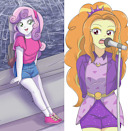





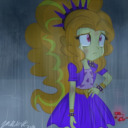
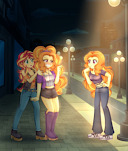
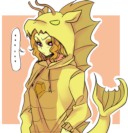

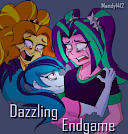


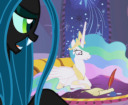

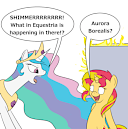

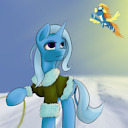

First comment doubling as author’s notes. More notes here.
Sirens have one weakness, both in mythology (Odysseus) and in canon (Vinyl Scratch) – those who can’t hear. One person being immune to your spell is potentially all it takes to be your undoing, especially when they’re the person you sleep next to.
So, when taking the view that the sirens are immortal, and have been on earth for hundreds, perhaps thousands of years, I hold that Adagio found true love exactly once, and she had to leave him behind. And she might be being a little self-centered here when she says that them losing their voices is the arts crime of the millennium, because even greater is surely that the Shakespeare of Music never heard the most important of his own works.
So I think the Viennese waltz is irrevocably tied up for her with the memory of their courtship, being the dance of choice in Vienna in 1800. And the one thing I think even more devastating for her than having to flee Vienna was learning of String Quartet No. 14, Op. 131, fifteen years later.
It’s hard to imagine today what music must have been like back then. An art form designed around structured templates, based on rules rather than expression. One man changed all that.
Hence his comparison with Shakespeare. “Scarcely any significant composer since his time has escaped his influence or failed to acknowledge it. For the respect his works have commanded of musicians, and the popularity they have enjoyed among wider audiences, he is probably the most admired composer in the history of Western music.” Sadie, S. (eds.) (1995) The New Grove Dictionary of Music & Musicians, in 20 volumes, Fifth Edition.
And, among his body of work, this most influential of men had a favourite composition, the one he thought most groundbreaking: a string quartet built of seven movements, with three on each side framing the massive centrepiece fourth movement.
And that fourth movement, in turn, is subdivided into seven variations, and the central one of those – the heart of the heart of the most important piece of music ever written, which prompted Schubert to ask, "After this, what is left for us to write?"…
...is titled simply Adagio.
If Adagio had a voice with which to sing her song, it would sound like this.
This was a good piece to read. Emotional, introspective, haunting. You managed ttyl do a fantastic job capturing Adagio's voice here despite her lack of an audible one.
Also, I'm an absolute sucker for the headcanon where the sirens go mute after losing their gems, so that pulled me in immediately.
Of all the stories you’ve talked about with me, I think there have been two that I most desperately wanted to see written. This was one of them.
It was worth the wait I don’t know what more to say about it than that--I can count at least two or three images, some big and pronounced and some small and fleeting, a piece of backstory, and several lines that all would’ve enriched another story and made it memorable, but here it’s like you’ve thrown it all together and wrapped it up with prose that’s felt more beautiful than anything I’ve seen you do before.
I don’t know what more to say about it than that--I can count at least two or three images, some big and pronounced and some small and fleeting, a piece of backstory, and several lines that all would’ve enriched another story and made it memorable, but here it’s like you’ve thrown it all together and wrapped it up with prose that’s felt more beautiful than anything I’ve seen you do before.
Thank you
As a dancer myself, I loved this fic. It captures the feeling of dancing really well, and I loved all the dance terms and references, specifically the ballet and pointe moves. The Queen of the Night gag was also a nice touch.
This story better get feature.
9014720 Thanks very much! I remember being struck with this idea while reading Fading Melodies, which was a great story, but I felt could have gone a bit further with it, which is what I tried to do here.
I was going to say that there was another voiceless one I really liked, but then I realised you’re the guy who wrote it You created something meaningful and lovely for a contest I only trolled
You created something meaningful and lovely for a contest I only trolled 
Writing Adagio again was fun! She’s my favourite character, but it seems I’ve hardly written from inside her head for not far off two years So it was really good to rectify that!
So it was really good to rectify that!
9014754
Of course you are very welcome I’m really happy you liked it!
I’m really happy you liked it! 
I think I can guess two of the images? And the backstory bit is the having to flee Vienna thing?
I think that might be your influence? Adagio here is more classical than I’d write her, I think, especially as I tend to go for the angle of them being teenagers.
Adagio here is more classical than I’d write her, I think, especially as I tend to go for the angle of them being teenagers.
9014888 For realsies?
For realsies?
I did wonder what any dancers might make of it, and quite how much I mangled things I did pick up a lot of respect for all the styles mentioned here, while I was doing research. I thought the discipline of classical musicians was enviable, but they’ve got nothing on ballet dancers
I did pick up a lot of respect for all the styles mentioned here, while I was doing research. I thought the discipline of classical musicians was enviable, but they’ve got nothing on ballet dancers  I hadn’t given much thought before either to how one might choreograph a ballet, but coming up with the moves to match the music was rather inspiring to write, especially the six pirouettes. What styles of dance do you perform, if you don’t mind me asking?
I hadn’t given much thought before either to how one might choreograph a ballet, but coming up with the moves to match the music was rather inspiring to write, especially the six pirouettes. What styles of dance do you perform, if you don’t mind me asking?
Thanks! I ummed and ahhed about whether to include the musical influences bit, so thanks for saying you appreciated it I was listening to the Hammerklavier Sonata and wondering if that would work as Sonata’s thing, and the opening is kind of ‘her,’ but it’s a bit too audacious a work to be hers, so I threw in the joke about Sonata Form instead.
I was listening to the Hammerklavier Sonata and wondering if that would work as Sonata’s thing, and the opening is kind of ‘her,’ but it’s a bit too audacious a work to be hers, so I threw in the joke about Sonata Form instead.
9015222 Thanks! I would not say no to that
Which would be kind of ironic, for a story which concludes that audience size ultimately doesn’t matter as much as your friends
Absolutely amazing! I am literally at a loss for words to say how sucked in and moved I was by this story.
I love your take on the Dazzlings. Love it.
9014561
Wow.
It's a rare treat to see a story that alludes so believably with real-world history.
Really creative, with a lot of emotion behind it, but a bit too sad for my taste.
...I feel like that should somehow surprise me, but it doesn't.
9015634 Thanks a lot! At a loss for words is kind of an unfortunately appropriate response to this one
I would say this one is my headcanonical view of them, in which they’re teenagers rather than immortals and so a bit less tragic than here. I think that angle is better for stories set around CHS, but no way would this story have worked half as well like that. Plus, the song is called Immortal Melancholy, so there wasn’t much debating that one
9015641 Thanks! That came to light when Naiad and I had just met and were planning our first story! It is nice to bring it up here, so it finally sees the light of day, two years on
Yeah, that string quartet connection is really rather magical, I think
9015755 Totally fair to say! And I’m surprised more people haven’t offered that view, too
I must have had The Changing Tides on my Read It Later list for a year or so before I finally decided it would be a good day to read something that sad!
9015306
I take ballet, pointe, and musical theatre currently, and have also taken hip-hop before. I also like dabbling in bits and pieces of pretty much any kind of dance.
9016228 Sounds like you must really know your stuff! I am really glad I didn't go for her doing pointe barefoot then, as I was thinking of before I came up with the excuse of the long-haired carpet! The internet said it was technically possible to stand that way, but dancing like that was a definite no.
Sounds like you must really know your stuff! I am really glad I didn't go for her doing pointe barefoot then, as I was thinking of before I came up with the excuse of the long-haired carpet! The internet said it was technically possible to stand that way, but dancing like that was a definite no.
I did look at some Hip Hop moves; I was looking at some videos and wondered about having a Hip Hop turn in there, or even having Sonata do some breakdancing during her solo freeform bit, but it didn't quite match the style of the rest of it in print
s6.postimg.cc/5pzpmopep/Pirate_Approved2.jpg
Well done, good Sir and/or Madam... well done indeed,
9021104 I thought you had sailed for less-pony-filled shores!
I thought you had sailed for less-pony-filled shores!
And that I’d never get that particular badge posted on my work
So thank you, kind pirate
This is a fantastic story! I featured it on episode 228 of my podcast, Pony 411.
The lack of dialogue really works, love how history is tied into the lives of the Sirens, and it's just really moving. My co-host also likes the music choice you recommend at the beginning of the fic.
9021283
That doesn't mean I'm not still paying attention,
Also your choice of suggested music was bloody magnificent. This work is a beautiful example of how a blend of sound and written word can create an experience that neither could alone.
9021484 Thanks very much!
I don’t think I’ve ever been mentioned on a podcast before It meant a lot more, I think, hearing your feedback spoken aloud than reading it in a comment, because you can really hear the passion coming through
It meant a lot more, I think, hearing your feedback spoken aloud than reading it in a comment, because you can really hear the passion coming through  Which, now I think about it, is a particularly unfortunate revelation to be connected to this story, since that’s exactly what Adagio is cut off from
Which, now I think about it, is a particularly unfortunate revelation to be connected to this story, since that’s exactly what Adagio is cut off from  Funnily enough, the other story you mentioned, by Summer Dancer, has been sitting on my read it later list for a few days
Funnily enough, the other story you mentioned, by Summer Dancer, has been sitting on my read it later list for a few days 
I think it would be fair to say the total lack of dialogue was a bold choice? As I mentioned below to the guy who wrote Voices Lost, I thought of the idea while reading Fading Melodies, which I’m pretty sure was the first story to do voiceless sirens. But I kind of thought that if you’re going to do a story about not being able to talk, then make it one with no talking, so you can kind of experience how it feels to be stuck inside someone’s head. Joss Whedon has this lovely idea that when we stop talking, we start communicating, and that kind of shows up here, especially when Adagio notes that it’s the first time in ages Aria and Sonata haven’t been throwing insults at each other.
That’s great to hear your co-host appreciated that! I wasn’t quite sure if that would work, with having to picture the music as described in the text while other music plays in the background (or rather, a different part of the same piece, since the chances of you reading at exactly the speed of the piece as described in the story are miniscule ). I’ve yet to try reading it myself while the music is playing, and don’t hold out much hope of being able to concentrate on it while doing so, so, however narcissistic it makes me sound, I’m a little jealous of your co-host’s ability to do that; he’s had an experience with the story that I haven’t
). I’ve yet to try reading it myself while the music is playing, and don’t hold out much hope of being able to concentrate on it while doing so, so, however narcissistic it makes me sound, I’m a little jealous of your co-host’s ability to do that; he’s had an experience with the story that I haven’t 
If he liked the music in general, by the way, then I’d highly, highly recommend the 2003 reimagining of Battlestar Galactica, from which it comes. The soundtrack to the series, and the way the music integrated with the rest of it, was groundbreaking. As a trailer of sorts, here is its intro remade with ponies:
9021979 Thanks, I’m not sure the story would have been the same if not for those blog entries you did tying in with The Friend I Couldn’t Be, charting the sirens through human history
It’s really quite a piece, that, isn’t it? I really can’t recommend the BSG soundtrack enough, especially season 3, whether you’re a fan of the show or not. Though that, too, is stunningly good! (And written by the head writer from DS9 and early Voyager, to match the uniform in your picture).
9023525
Indeed. Conveying meaningful character interaction with no dialogue is difficult, particularly when it's in text form. And you did it quite well. Funnily enough, I've read both of the fics you linked.
He's watched Battlestar Galactica in its entirety! In fact, after we were done recording he was complaining because one of the soundtracks was never released digitally. I personally watched the first 2 seasons, but then it was removed from Netflix. I watched the original series though.
I watched the original series though.
9025856 Unless he means the soundtrack from the miniseries, I think I’ve got them all?
Well worth checking out the rest of it if you get the opportunity, I’d say! Can’t say I was much of a fan of the original, though. Lots of other sci-fi, but not so much that one
Few seem to get that the Dazzlings are ancient beings. This story did, and did so nicely.
I’ve just finished re-reading this, and wow, it was not any less intense an experience the second time through. There was a moment that I don’t think I caught the first time through that really leapt out to me this time, though--that moment where Adagio nudges Aria towards acceptance just by looking at and dancing with her was profoundly beautiful.
Obviously, very very very biased, but I don’t think I can praise this enough, nor thank you profusely enough for making it happen
9060067 Thanks!
Over the last year I've come to appreciate the value of the siren-only story. At first most of the ones I read were the sirens reintegrating at CHS, whether learning friendship or remaining a thorn in everyone's side, and often being shipped with various Rainbooms. In that context, I think, it's much better that the sirens are teenagers. I think that fits better with the facts of Rainbow Rocks, and avoids the general creepy and pathetic nature of immortal villains hanging out with/becoming friends with/sleeping with teenagers.
But, thanks mostly to Naiad, I've come to appreciate that with stories that focus more on just the sirens themselves; such a wealth of depth can be explored if you bend canon a little bit so they're immortal and have been on Earth for a millennia or so. And it takes the bond between them from captivating to spellbinding. Opens up a lot of fun new story possibilities, too.
In those instances, though, I think it really is very important to emphasise their immortal nature, and how that sets them apart from humans. It pushes characterisation in certain directions, too, like another story I wrote in which Aria in particular is almost gleefully indifferent to the value of human life. So, having spent a while here getting frustrated at other authors writing sirens as immortal but acting like that isn't a big deal and doesn't change much, and being unable to address that in my early stories (since they followed the canon that the sirens were teenagers), I now dwell on it quite heavily whenever it comes up.
Thanks for the nice comment and the opportunity to discuss it!
9066148
No problem! I don't mind Dazzling/Rainboom ships or interaction much, but there's none I particularly favor. However, just treating them as more everyday humans instead of mythical creatures and wily beings that are centuries old and above many human things is such an assassination to the characters. I may have only written them once, but it was something I enjoyed keeping in mind. If you like that kind of siren mythos, you should probably check out 'We Are What We Are' if you already haven't.
9066187 I really need to try that one again. I started reading it a couple of years ago, but stopped during the second chapter when it got really heavy on OCs. The one I’d recommend for all things immortal siren is Welcome to the Show, which is a bit ironic as Aria is the protagonist there and Adagio a little bit the antagonist, but not really, and I remember seeing your siren story before but passing over it because the description suggested Adagio would be more a force of conflict than someone we were supposed to be on side with. I will try giving it a read
9072385
Well thank you! I do hope you like it!
I'll be sure to check out the one you suggested. As for We Are What We Are, it uses a lot of OCs thrown in with all the Siren goodness, since most of the historical characters and modern EqG people aren't canon characters. I'd still really recommend it!
You can has review!
I'm going to have to disagree, I'm pretty sure you wrote this for me? And thank you? ;_;
Adagithoven is the pairing I didn't know I needed.
In any case, I have seen the sirens as monsters, conquerors, nuisances, the destitute, and even friendship students, but almost never as artists. Your portrayal of them as such is masterful, to say nothing of how you portray the bonds between them. You even redefine the witticism about how writing about music is like dancing about architecture. After all, Adagio's building a legacy with that final performance.
This is an incredible display of cross-medium artistry, and a wonderful eulogy for these characters. Siren fics are a relatively hard sell for me, but you made this work fantastically. Thank you for it.
I completely loved this story.
9420500
I completely agree with Paul on this one.
This story is absolutely beautiful and the musical accompaniment is just as beautiful.
I can't say anything that hasn't been said before other than I came in here a little skeptical. By the time I finished reading, the story has earned its place in my "Absolute Masterpieces" bookshelf.
Seriously, this story gets better the more you read it.
Signing out, VShuffler42
Finally got around to reading this because if the RCL contest. All I can really add is that I noticed the WoT reference there.
9680842 Ooh, that's the first I'd heard of the RCL contest, thanks for mentioning it!
9695855
The sa'sara.
9696624
You manage to absolutely nail everything I love about music here, and the emotions it can evoke. From melancholy to introspection, to the sexual, the passion. The sense of unity that music can bring out in people, to the frenzy of a crescendo. Through one piece of music, you take us through a journey.
Even the ending perfectly encompasses that odd sense of emptiness that can come at the end of a song, as though the part of you that sparked to life during the music now dies along with the fading chords. The not-quite-ambiguous ending puts that into words just wonderfully.
There’s so much to dig into: Adagio’s history, so much being said between the three without any dialogue at all, and the sheer gravity of the whole scene. This isn’t just a dance; this is Adagio coming to terms with mortality. An absolutely brilliant read, from start to finish.
I’m curious, though. Those references to Sonata and Aria, particularly the punk music coming from Aria’s bedroom at the start and the two staring at Adagio about halfway through – they wouldn’t happen to be nods of the head to Tethered-Angel’s Bullets, would they?
10114300 Thank you very much, this was a lovely comment to receive!
I really like how you put things here, I hadn't consciously thought of it in those terms myself at times, so this was fascinating and enlightening.
This, in particular, resonated with me. You're absolutely right, there's that afterimage of feelings as the echoes in your own head fade, and you come back to reality. Music absolutely is a journey, and skipping to (or back to) 'the good bit' is never the same as hearing it through from the start. Also, perhaps that's part of why we applaud at concerts, because the roar of a crowd is the best way available to continue that euphoria and let the song bleed away into something positive.
Thanks, you've just helped me understand something here I had this story in my head for the better part of two years before writing a word of it, and right from the start I knew I wanted the opening and closing sentences to be the same, about the silence in the bedroom and the memories of the music that had been. But I never really thought about why. And it was only coming back to reread it several months later that I questioned it, wondered why that had been so important. None of my other stories echo their opening lines like that, and the rest of this story is all one scene, so the short epilogue is a strange choice rather than ending it on the poignant moment of Adagio's journey ending. Not a choice I ever regretted, I mean, but one I whose necessity I struggled to put into words.
I had this story in my head for the better part of two years before writing a word of it, and right from the start I knew I wanted the opening and closing sentences to be the same, about the silence in the bedroom and the memories of the music that had been. But I never really thought about why. And it was only coming back to reread it several months later that I questioned it, wondered why that had been so important. None of my other stories echo their opening lines like that, and the rest of this story is all one scene, so the short epilogue is a strange choice rather than ending it on the poignant moment of Adagio's journey ending. Not a choice I ever regretted, I mean, but one I whose necessity I struggled to put into words.
But you managed it, and I understand it now! It's the silence between the songs, always the same in physical signature but different each time in experience, as how we perceive it is shaped by the anticipation of what's to come and the memory of what's just been.
Ooh, interesting comparison! Tethered is one of my closest friends around these parts, and I liked Bullets a lot, though must admit I haven't reread it since it first came out. And there are numerous references in this story to others both on fimfiction and published in print. But no, that bit isn't one of them, that one was all me Incredibly loud punk music for days on end is exactly how I think Aria would deal with the situation! The fimfiction reference I remember most prominently is a reference to my favourite moment in Naiad's story To Extinguish the Dawn:
Incredibly loud punk music for days on end is exactly how I think Aria would deal with the situation! The fimfiction reference I remember most prominently is a reference to my favourite moment in Naiad's story To Extinguish the Dawn:
And the more times I read that, the more that moment, in a story that was otherwise fairly quiet, strikes me as perfectly encapsulating what makes a siren.
Thanks again for your kind words and detailed, thoughtful comment
10134108
Wow, thanks! I always try to browse the comments for exactly this reason - it's fascinating to hear about an author's mindset and goals when writing a story (particularly one as introspective as this), so the fact that you're willing to give a reply, let alone one as detailed as this, means a lot.
The whole "music is a journey" aspect comes through in spades, both in the obvious crescendos and interludes that you describe, but also in the way Adagio almost bleeds her way through history and culture in her dancing. I say this as someone with absolutely no formal knowledge or tuition in dance or music so take that for what it's worth, but seeing some of the other comments from those who do, kudos for being able to appeal to both the layperson and the professional.
Wow, I... I never expected that my note on the ending helped you understand something. I'm going to come clean, at first I had no idea what to make of the ending, I only knew that it suited that melancholic-but-at-ease tone of the whole story a hell of a lot better than lol they dead. But it really grew on me the more I thought about it. And, hell, I think you helped me understand something as well with what you said:
That's a great way of putting it as closure to the journey. It's not so much an end, but it's moving on, and not just euphemistically. "The memory of fading motes of perfect symphonies", indeed...
Apologies for seeing a link to Bullets that wasn't there, hope that didn't come across as lessening your own work. I'll admit it took me completely by surprise as well - I only considered it when my mental image of Aria & Sonata during that scene instinctively gave Aria the cuts on her arm and Sonata her bloodied nose. Maybe Aria's personality is just ripe for depicting her using noise to drown out agony, using anger to mourn until there's nothing left as in her "unreadable expression". Or maybe she was just staring at Adagio like she had two heads, alone, in her room, dancing barefoot .
.
Thanks again for the reply, it was really fascinating to read and I'm seriously impressed you remember all those details nearly two years on! Cheers for pointing me to Extinguish the Dawn as well - that's definitely going in my "read later" list!
The Venn diagram of people that are into Equestria Girls sequels, have the requisite level of knowledge about music, dance, and history that this piece reflects, and have the writing talent to produce something of this quality… well, it’s kind of a miracle this exists, but I’m so glad it does.
It just has the best sort of melancholy.